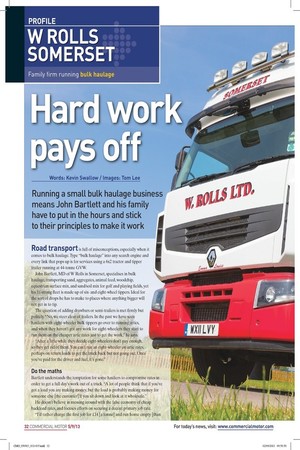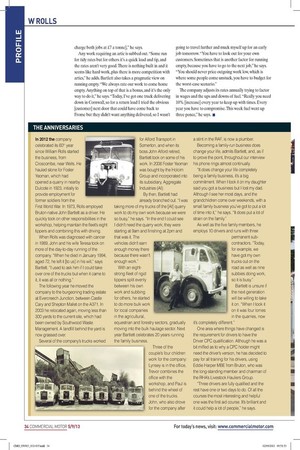Words: Kevin Swallow / Images: Tom Lee Running a small
Page 24

Page 26

If you've noticed an error in this article please click here to report it so we can fix it.
bulk haulage business means John Bartlett and his family have to put in the hours and stick to their principles to make it work
Road transport is full of misconceptions, especially when it comes to bulk haulage. Type "bulk haulage" into any search engine and every link that pops up is for services using a 6x2 tractor and tipper trailer running at 44-tonne GVVV.
John Bartlett, MD of W Rolls in Somerset, specialises in bulk haulage, transporting sand, aggregates, animal feed, woodchip, equestrian surface mix, and sand/soil mix for golf and playing fields, yet his 11-strong fleet is made up of sixand eight-wheel tippers. Ideal for the sort of drops he has to make to places where anything bigger will not get in to tip.
The question of adding drawbars or semi-trailers is met firmly but politely. "No, we steer clear of trailers. In the past we have seen hauliers with eight-wheeler bulk tippers go over to running artics, and when they haven't got any work for eight-wheelers they start to run them on the cheaper artic rates just to get the work," he says.
"After a little while they decide eight-wheelers don't pay enough, so they get rid of them. You can't run an eight-wheeler on artic rates, perhaps on return loads to get the truck back but not going out. Once you've paid for the driver and fuel, it's gone." Do the maths
Bartlett understands the temptation for some hauliers to compromise rates in order to get a full day's work out of a truck. "A lot of people think that if you've got a load you are making money, but the load is probably making money for someone else [the customer] if you sit down and look at it wholesale."
He doesn't believe in messing around with the false economy of cheap backload rates, and focuses efforts on securing a decent primary job rate. "I'd rather charge the first job for £14 [a tonne] and run home empty [than
charge both jobs at £7 a tonne]," he says. Any work requiring an artic is subbed out. "Some run for tidy rates but for others it's a quick load and tip, and the rates aren't very good. There is nothing built in and it seems like hard work, plus there is more competition with artics," he adds. Bartlett also takes a pragmatic view on running empty. "We always rate our work to come home empty. Anything on top of that is a bonus, and it's the only way to do it," he says. "Today, I've got one truck delivering down in Cornwall, so for a return load I tried the obvious [customer] next door that could have come back to Frome but they didn't want anything delivered, so I wasn't
going to travel further and muck myself up for an early job tomorrow. "You have to look out for your own customers. Sometimes that is another factor for running empty, because you have to go to the next job," he says. "You should never price outgoing work low, which is where some people come unstuck, you have to budget for the worst-case scenario." The company adjusts its rates annually trying to factor in wages and the ups and downs of fuel. "Really you need 10% [increase] every year to keep up with times. Every year you have to compromise. This week fuel went up three pence," he says. •









































